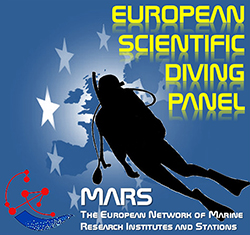– Legal status of scientific diving (see definition on the ESDP web site)
Scientific and Archaeological Diving is recognised as one of the five main diving at work sectors in the UK. All UK diving at work must adhere to the 1997 Diving at Work Regulations|The 1997 Diving at Work Regulations with specific advice and guidance on scientific diving (SD) being provided by the 2014 Scientific and Archaeological diving projects Approved Code of Practice|the 2014 Scientific and Archaeological diving projects Approved Code of Practice. The ESD and AESD|SD European Standards standards are approved qualifications to dive as are some other national qualifications and some recreational qualifications|Diving qualifications: Approved list. A check-out dive is a common practice for new members joining a SD team.
– Medical examinations – fitness to dive
Medical examinations suitable for diving at work in obtained in other EU countries apply also in the UK, as long as:
– they comply with the local level of scrutiny;
– have been carried out by a medical practitioner;
– have been carried out within 3-months of coming to the UK.
The examinations can only remain valid for 12 months from the date of examination irrespective if the medical is valid for longer in the other country. If staying longer than 12 months, it would be expected that the diver obtains a UK diving medical.
– Insurance
If employed by an UK institution, the diver would be covered by that institution’s liability and indemnity insurances. If not, then the diver would have to provide their own. Medical insurance would depend on the country of origin. At present, all healthcare in the UK for citizens of the EEA and Switzerland is covered by the European Health Insurance Card (EHIC) scheme; this includes recompression of divers. This remains valid until 31 December 2020; arrangements for people travelling to the UK after 31 December 2020 are subject to the current negotiations on the future UK-EU relationship
– Decompression issues
There are no specified methods for controlling decompression. All the regulations state is that “Decompression procedures (including the use of a decompression computer) should be appropriate for the type of diving technique undertaken and their use included in the diving project plan. For surface-orientated diving, decompression procedures should be consulted to determine whether the dive requires ‘in-water’ decompression. All decompression procedures should be designed to take into account the risks of a particular type of dive and should include the various rules and procedures needed in order to reduce the risk of decompression illness (DCI).”
– First Aid
Although it is recommended that all divers possess certified training in first aid at work, the regulations state that there should be sufficient people in the team qualified for first aid. This would be determined by risk assessment.
– Scientific Diving Procedures
All UK diving at work must adhere to the 1997 Diving at Work Regulations|The 1997 Diving at Work Regulations with specific advice and guidance on scientific diving (SD) being provided by the 2014 Scientific and Archaeological diving projects Approved Code of Practice|the 2014 Scientific and Archaeological diving projects Approved Code of Practice. Additional guidance notes on SD are recognised by the UK regulators but are currently being revised.
– Breathing gas / equipment / depth limitations
All diving equipment must be CE marked but there are no other limits on what diving equipment or breathing gases can be used if the divers and dive supervisors are all competent in their use.
Although no depth limitations are stipulated in the regulations, any dives deeper than 50 metres require a suitable, operational, two-person, two-compartment chamber on site.[
– Volunteers[/brun]
[bleu marine]The situation for accepting volunteers for SD is complex in the UK and should be assessed on a case by case basis.
– More information
The coordinating body for UK SD is the SDSC (Scientific Diving Supervisory Committee). For any further questions concerning SD in UK, please contact us via the website at: www.uk-sdsc.com
